|
|
|
Sort Order |
|
|
|
Items / Page
|
|
|
|
|
|
|
| Srl | Item |
| 1 |
ID:
091414
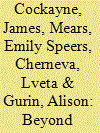

|
|
|
|
|
| Publication |
New York, International Peace Institute, 2009.
|
| Description |
333p.
|
| Standard Number |
0937722979
|
|
|
|
|
|
|
|
|
|
|
|
Copies: C:1/I:0,R:0,Q:0
Circulation
| Accession# | Call# | Current Location | Status | Policy | Location |
| 054416 | 355.03/COC 054416 | Main | On Shelf | General | |
|
|
|
|
| 2 |
ID:
122240
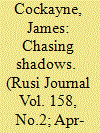

|
|
|
|
|
| Publication |
2013.
|
| Summary/Abstract |
Experience of conflict over the last two decades - from Haiti to Liberia to Afghanistan - points towards the likelihood that armed groups will adopt criminal strategies as a way of maintaining power during and after conflict, exploiting the state's vulnerability. However, policy responses have yet to prove effective in dealing with this threat. James Cockayne explores the relationship between criminal groups and political power, debunking longheld myths that such groups are primarily economic actors, before considering how a more strategic, evidence-based approach to tackling organised crime in conflict-affected states might be developed and implemented.
|
|
|
|
|
|
|
|
|
|
|
|
|
|
|
|
| 3 |
ID:
086201
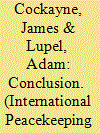

|
|
|
|
|
| Publication |
2009.
|
| Summary/Abstract |
This conclusion reviews the Special Issue's perspective on organized crime as both potential 'enemy' and 'ally' of peace processes. The social and economic power wielded by organized crime is highlighted, pointing to the role that peace operations play as an intervening variable between individuals/communities and the environments in which they operate. Peace operations use a range of tactics, from coercion to co-option, working with or against organized crime. However, these tactics will only be successful if they are framed within a coherent strategy, which may pursue either containment or transformation - or seek to combine them - through a phased transitional strategy. Peace operations should be a key component in a broad strategy of intelligent international law enforcement.
|
|
|
|
|
|
|
|
|
|
|
|
|
|
|
|
| 4 |
ID:
071595
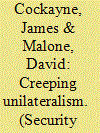

|
|
|
|
|
| Publication |
2006.
|
| Summary/Abstract |
In this article, it is argued that the genesis of the Iraq Crisis of 2003 within the Security Council can be traced to earlier patterns of acquiescence by Council members in US and UK unilateral enforcement action in Iraq. By the time this acquiescence ceased, between 1994 and 1996, UK and US enforcement policy was set and would culminate in Operation Iraqi Freedom in March 2003.
|
|
|
|
|
|
|
|
|
|
|
|
|
|
|
|
| 5 |
ID:
134390
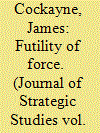

|
|
|
|
|
| Summary/Abstract |
Confronted by non-conventional non-state military forces enjoying high – but very localized – social legitimacy, the United Nations Mission in Haiti (MINUSTAH) struggled between 2004 and 2007 to embed the use of force in a larger strategy of state consolidation. The article explores the confrontations between MINUSTAH and unconventional armed groups in Haiti during this period. It traces MINUSTAH’s operations against criminal gangs, and the resulting process of strategic learning. It explores how tactical innovations allowed MINUSTAH to defeat the gangs, but also highlights that the larger political objective – breaking the connection between the gangs and Haiti’s political-business elite – remained unarticulated and elusive – and perhaps ultimately unfeasible, given the necessity of Haitian state consent for continued UN operations in the country. In a final post-script the article reflects on the return of the gangs after the earthquake of 12 January 2010, and what it signals about the limited impact of tactical force on the presence and power of political-criminal networks.
|
|
|
|
|
|
|
|
|
|
|
|
|
|
|
|
| 6 |
ID:
086189
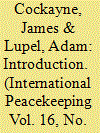

|
|
|
|
|
| Publication |
2009.
|
| Summary/Abstract |
Peace operations are increasingly on the front line in the international community's fight against organized crime. In venues as diverse as Afghanistan, the Balkans, Haiti, Iraq and West Africa, multiple international interventions have struggled with a variety of protection rackets, corruption and trafficking in a wide range of licit and illicit commodities: guns, drugs, oil, cars, diamonds, timber - and human beings. This introduction to the Special Issue on peace operations and organized crime discusses the concept of 'organized crime' as a label, and suggests ways of differentiating organized crime groups on the basis of their social governance roles, resources and strategies towards authority structures - such as peace operations.
|
|
|
|
|
|
|
|
|
|
|
|
|
|
|
|
| 7 |
ID:
064699
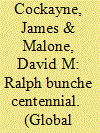

|
|
|
|
|
| Publication |
Jul-Sep 2005.
|
|
|
|
|
|
|
|
|
|
|
|
|
|
|
|
| 8 |
ID:
086196
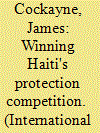

|
|
|
|
|
| Publication |
2009.
|
| Summary/Abstract |
This article draws lessons from the experiences of international involvement in Haiti from 1990 to the present day. It argues that if the model of liberal, responsible government championed by the international community is to provide a resolution to the ongoing violence and instability in Haiti, then Haitian society will first have to be wooed away from coercive 'protection' by local and transnational organized crime. However, it argues that peace operations as they are currently conceived and deployed are ill-equipped for this task, given their limited territorial ambit and traditional focus on military response rather than political economy. However, the article concludes that experiences in Haiti may also offer lessons about how peace operations could win 'protection competitions' by serving as the leading edge of a unified international strategy for the transformation of local political economies.
|
|
|
|
|
|
|
|
|
|
|
|
|
|
|
|
|
|
|
|
|